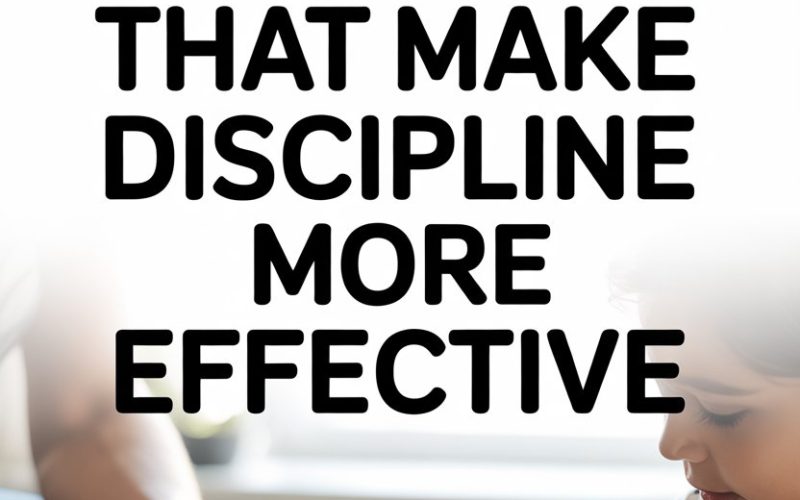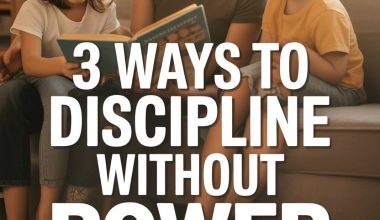Parenting often feels like a marathon run in slippers. You’re dodging Lego traps, negotiating snack treaties, and—somewhere between caffeine hits—trying to raise decent human beings.
Discipline is the backbone of this whole operation, but sometimes it feels like all you do is repeat yourself until your throat files for early retirement.
Good news: Small tweaks in what you say can work wonders. Here’s a pocketful of phrases you can use tonight that will actually make discipline stick.
1. I see you’re feeling…
Tantrums. The soundtrack of parenthood. When your child’s losing the plot—screaming over the wrong colour cup, for example—nothing feels less effective than barking “calm down!”
Instead, try: “I see you’re feeling really angry right now.” This simple line is emotional judo.
According to child psychologists, naming the emotion helps kids feel understood. They’re more likely to settle down when they know you get it, even if you don’t agree.
You’re not excusing bad behaviour. You’re showing you’re on their team, which means they’ll listen better when it’s time to set limits. (And yes, this works just as well on adults.)
2. You can choose…
Power struggles. They’re exhausting and—spoiler—nobody really wins. Kids crave control over their little universes, so giving them appropriate choices can sidestep a showdown.
Try: “You can choose to put your shoes on now, or I’ll help you in one minute.” Or, “Would you like carrots or peas with dinner?”
This phrase gives them a sense of agency without handing over the keys to the kingdom.
Researchers say offering choices boosts cooperation and cuts back on meltdowns. Just make sure you’re genuinely okay with either option (letting them choose between dessert or vegetables might end with you elbow-deep in ice cream).
3. I need you to…
Tired of sounding like a record on repeat? (Is “please put your socks on” echoing in your dreams?) Vague requests like “be good” or “stop it” don’t give kids much to work with.
Swap in: “I need you to use your inside voice.” Or, “I need you to keep your hands to yourself.”
Be specific, be direct. Experts recommend clear instructions over vague ones. This steers kids toward what you do want, not just what you don’t. It also sounds less bossy than barking out orders, which means less pushback.
4. When you… then you can…
Kids are masters of negotiation. They’ll try to bargain bedtime into 2027 if you let them. Setting up a ‘when-then’ structure offers clarity, not loopholes.
Use: “When you’ve brushed your teeth, then you can pick a story.”
This works better than threats or bribes. Parenting experts love it because it shows kids the order of things without turning you into the family drill sergeant. It’s a logical connection, not a punishment.
Bonus: It teaches delayed gratification (which, let’s be honest, is a superpower in adult life).
5. I know you can do this
Is your kitchen a stage for Oscar-worthy drama every time chores get mentioned? Sometimes, a spoonful of belief is the secret ingredient.
Try: “I know you can tidy up your toys all by yourself.”
Research shows praise focused on effort and capability (rather than just results) helps kids persevere. This phrase boosts confidence and encourages independence. You’re not just nagging—you’re their motivational speaker.
And if you’re greeted with a groan and a dramatic flop onto the floor? At least you’ve planted the seed.
6. It’s okay to feel… but it’s not okay to…
Big feelings, small bodies. Somewhere along the way, your sweet cherub learns the volcanic art of hurling a toy because the Wi-Fi is slow. That’s when boundaries matter.
Say: “It’s okay to feel frustrated, but it’s not okay to throw your toys.”
This approach validates the emotion but draws a line under unacceptable behaviour.
According to child development experts, separating feelings from actions helps kids learn self-control. You’re raising an emotionally intelligent human, not a miniature tornado.
7. We can try again
Ever wish you had a reset button? Kids do, too. After a meltdown, everyone needs a moment to regroup.
Say: “We can try again.” Or, “Let’s have a do-over.”
This phrase teaches that mistakes aren’t catastrophes—they’re opportunities to learn. It’s a message child psychologists rave about because it encourages resilience and growth. Plus, it’s great for your relationship: You’re showing forgiveness and hope, not keeping score like a grudge-holding elephant.
Making Discipline Work for Your Family
Discipline doesn’t need to sound like a drill sergeant’s manual.
A few well-chosen phrases can turn power struggles into conversations, tantrums into teachable moments, and chaos into something resembling order (or at least, controlled chaos).
Try one or two of these tonight. Watch what happens.
You might just find your child listens a little better, feels a little safer, and maybe—just maybe—puts their shoes on without a wrestling match.
And for the record, you’re absolutely nailing it—even if you did step on a stray raisin on the way to bedtime.





